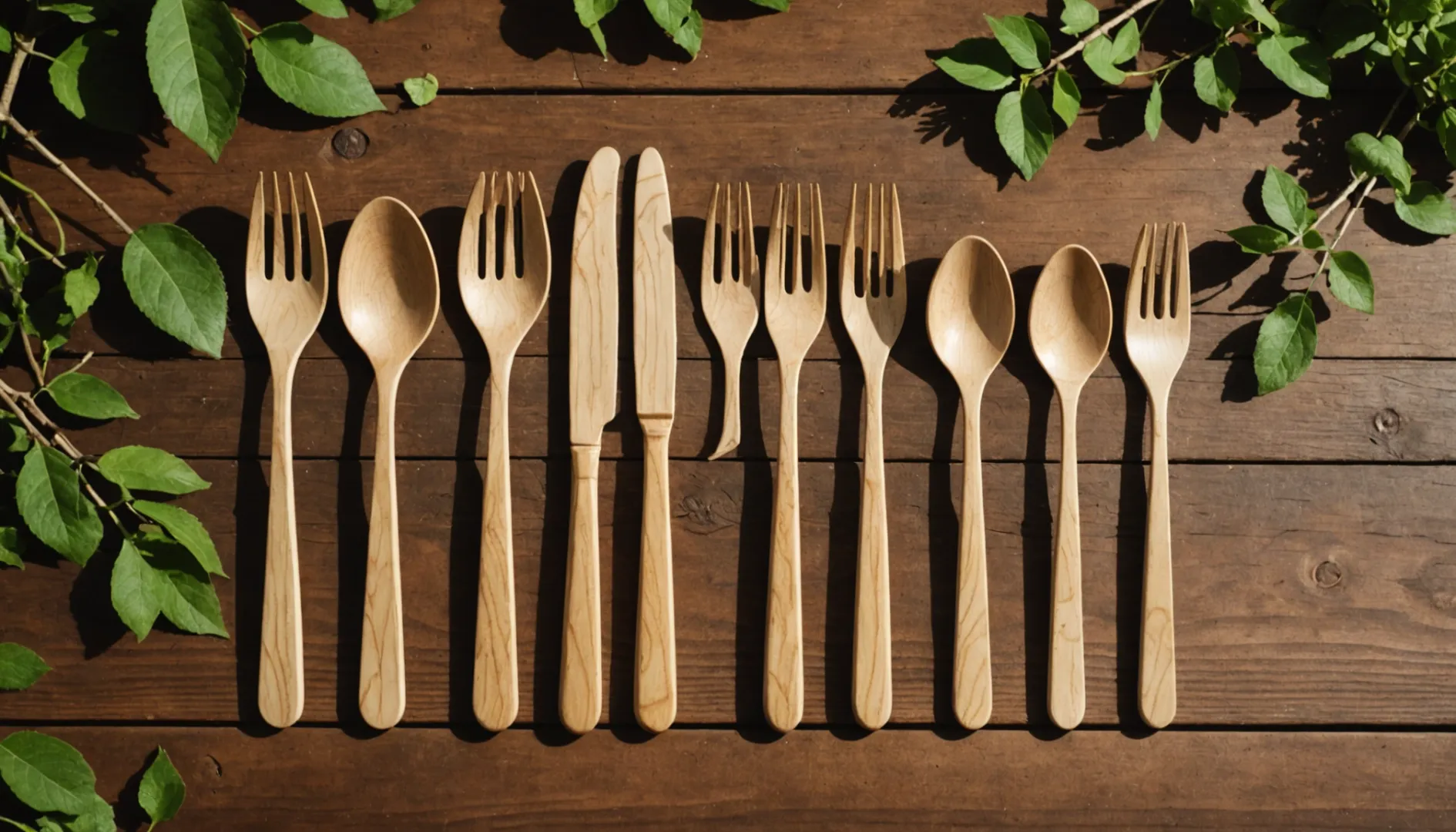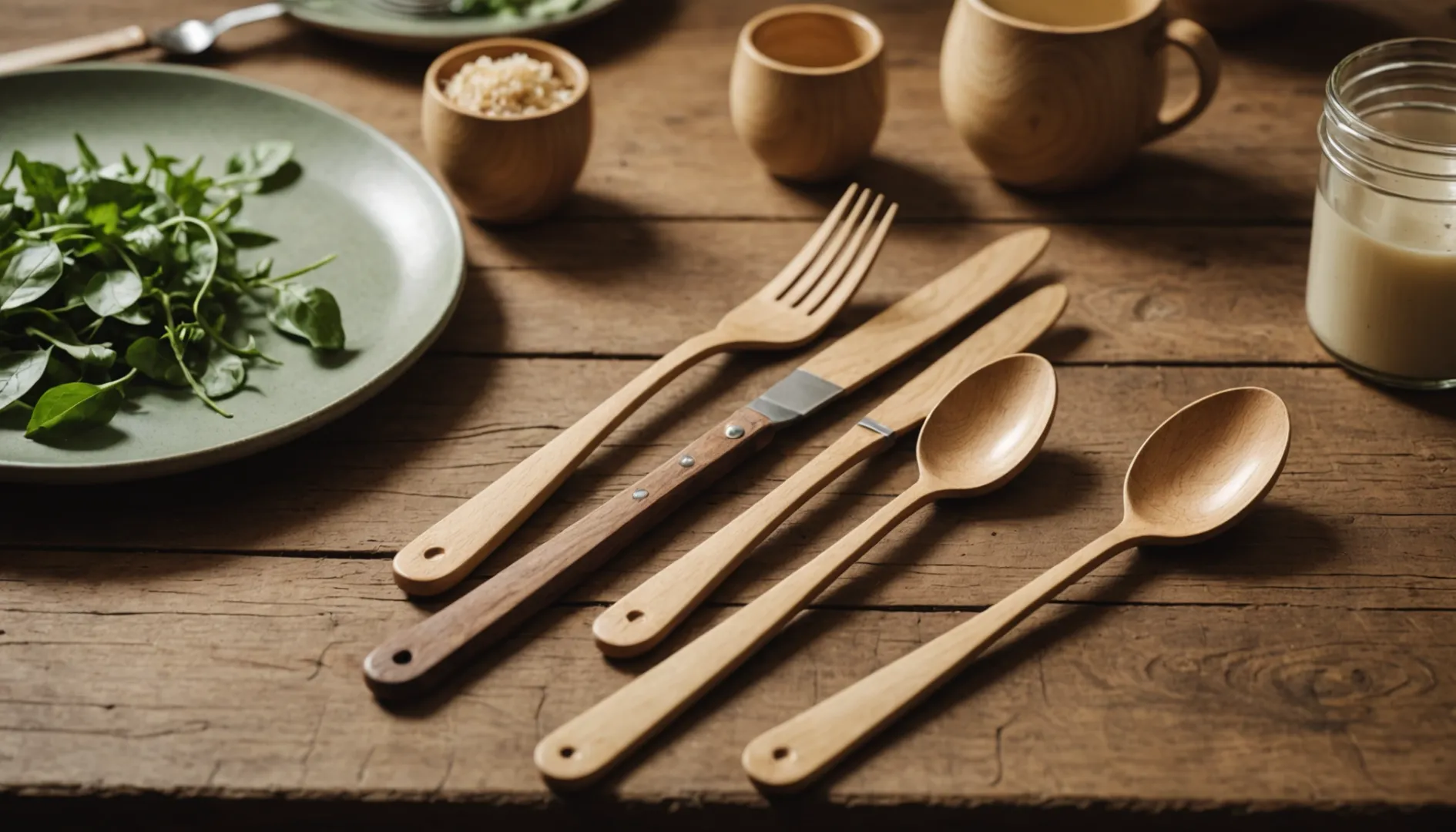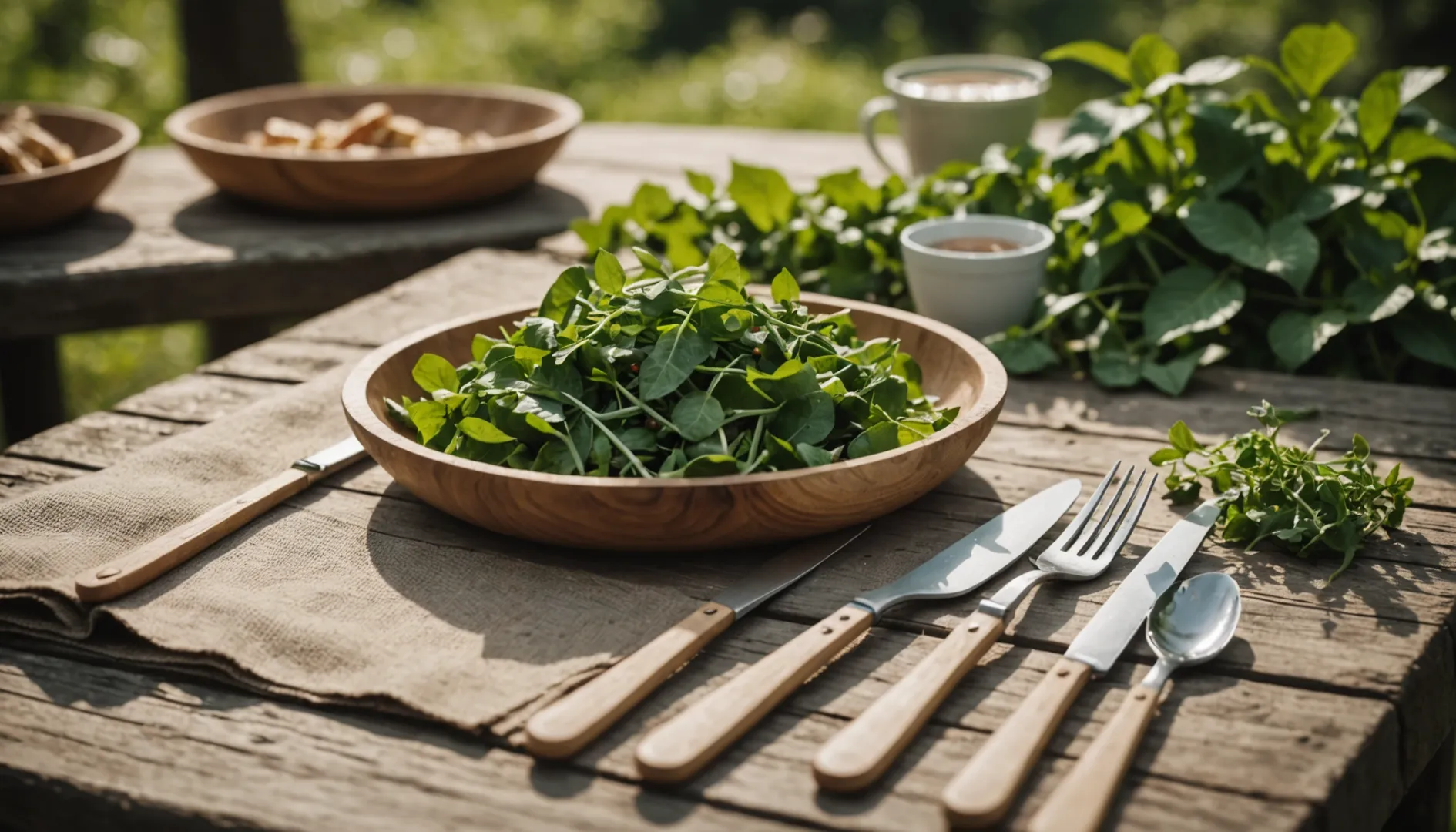
Ever wondered why BioPak's eco-friendly cutlery seems to cost a bit more? It's all about sustainability.
BioPak disposable wooden cutlery is pricier because it uses sustainably sourced birchwood and bagasse paper, which are biodegradable and compostable. This higher cost reflects the commitment to quality, ethical sourcing, and environmental certifications that ensure these products are truly sustainable.
I remember the first time I held a piece of BioPak cutlery; it felt different—solid and kind of like holding a promise to the planet. Sure, the initial sticker shock made me pause, but then I thought about the impact. It's like paying a bit extra for organic produce because you know it's better for you and the earth.
With BioPak, you're investing in something much bigger than just a fork or a spoon. You're backing a mission that's about reducing waste and promoting composting. Plus, their certification badges don't just look pretty—they're proof of genuine environmental effort. So, when you think about what goes into each piece, from ethical sourcing to third-party audits, the price starts to make more sense.
BioPak was founded in 2006 in Sweden.False
BioPak was founded in 2006 in Australia, not Sweden.
BioPak donates 1% of profits to environmental causes.True
BioPak donates a portion of its profits to preserve rainforests.
What Materials Make Up BioPak Wooden Cutlery?
Let me take you on a journey into the world of BioPak wooden cutlery and why it's my go-to for sustainable dining.
BioPak wooden cutlery is crafted from responsibly sourced birchwood, celebrated for its renewability, strength, and compostability. As a lightweight yet durable option, it stands out as an eco-friendly alternative to plastic cutlery, aligning perfectly with a commitment to sustainability.

Understanding Birchwood's Sustainability
Birchwood and I go way back. I remember the first time I used BioPak's cutlery at a picnic. It felt just right in my hand—sturdy yet light—and I knew I was making a difference by choosing it over plastic. Birchwood is harvested from sustainably managed forests, where new trees are planted to replace those that are used. This approach ensures that our natural ecosystems aren't harmed.
Every time I use these utensils, I'm reminded of how easily they decompose, unlike plastic. It feels good to know that less waste is ending up in landfills because of choices like these. The choice of birchwood reflects BioPak's dedication to offering products that align with eco-friendly values. Its use in cutlery is a testament to the potential of sustainable materials1 in everyday products.
The Role of Bagasse and PLA
Now, let's talk about bagasse and PLA. Bagasse, a sugarcane byproduct, is a fantastic alternative to traditional tableware. It's part of BioPak's wider range and complements the birchwood products beautifully. I once attended a wedding where bagasse plates were used, and they were as stylish as they were eco-friendly.
PLA, or polylactic acid, derived from plant starches, adds durability to these products without compromising on biodegradability. It's amazing how such simple materials can have such a significant impact. These materials further emphasize BioPak's role as a leader in biodegradable products2.
Ethical Sourcing and Certifications
One of the things I appreciate most about BioPak is their commitment to ethical sourcing. Their products come with a stamp of approval from third-party auditors, verifying their adherence to high social and environmental standards. When I see those ISO and B-Corp certifications, I know I'm supporting responsible practices.
This kind of transparency and dedication helps build trust. It’s reassuring to know that with every purchase, I'm not just choosing quality products but also contributing to a better planet. Engaging with certified eco-friendly brands3 makes all the difference in making informed and responsible choices.
BioPak's cutlery is made from birchwood.True
BioPak uses ethically sourced birchwood for its cutlery products.
BioPak operates only in Australia and the UK.False
BioPak also operates in New Zealand and Singapore, besides Australia and the UK.
How Does BioPak Ensure Sustainable Sourcing?
When I first learned about BioPak's sustainable sourcing, I was intrigued by their commitment to doing right by the planet. So, how exactly does BioPak ensure their materials are sourced responsibly?
BioPak ensures sustainable sourcing by setting high supplier standards, obtaining third-party certifications, and partnering with ethical suppliers. They focus on using renewable resources like birchwood and bagasse, underscoring their dedication to eco-friendly practices.

Rigorous Supplier Standards
BioPak meticulously selects suppliers based on stringent sustainability criteria. This means suppliers must adhere to high environmental and ethical standards. BioPak conducts regular audits to ensure these standards are consistently met, maintaining transparency and accountability in their supply chain.
Certifications and Audits
The first time I saw BioPak's ISO and B-Corp certifications, it felt like finding a hidden gem. These accolades are more than just badges; they are evidence of BioPak’s adherence to comprehensive sustainability metrics. Frequent third-party audits add that extra layer of assurance, making me trust their practices even more.
Emphasis on Renewable Resources
A significant aspect of BioPak's sourcing strategy involves using renewable resources like birchwood, bagasse, and PLA (polylactic acid). Birchwood is sourced from sustainably managed forests, ensuring that deforestation is minimized while maintaining biodiversity. Bagasse turns waste into a resource—a brilliant way to minimize deforestation—by utilizing it as a renewable and compostable material for various products.
Partnerships with Ethical Suppliers
BioPak actively collaborates with suppliers who share their vision for sustainability. These partnerships ensure that materials are sourced responsibly and ethically, supporting communities and preserving natural resources. By aligning with like-minded suppliers, BioPak can offer products that contribute to a circular economy, promoting recycling and composting initiatives.
Supporting Community Initiatives
Beyond sustainable sourcing, BioPak invests in community projects aimed at environmental conservation. Their initiative of donating 1% of profits to causes like rainforest preservation makes me feel hopeful about a sustainable future. It’s a testament to their philosophy of weaving environmental consciousness into every business aspect.
By maintaining strong supplier relationships4 and advocating for transparency, BioPak sets a benchmark in the industry for sustainable sourcing practices. Their dedication not only safeguards the environment but also supports social and economic well-being across their supply chain.
BioPak was founded in 2006 in Sweden.False
BioPak was founded in 2006 in Australia, not Sweden.
BioPak is ISO and B-Corp certified.True
BioPak holds ISO and B-Corp certifications, ensuring standards.
What Environmental Certifications Does BioPak Hold?
Ever wondered how some companies seem to seamlessly blend sustainability with their products? BioPak is one such company, leading the charge in eco-friendly packaging. Curious about what makes them a standout in the green world?
BioPak proudly holds prestigious environmental certifications like ISO 14001 and B-Corp, showcasing its unwavering dedication to sustainable and ethical business practices.

ISO 14001 Certification
The ISO 14001 certification is more than just a badge for BioPak; it's like a guiding light that illuminates their path towards sustainability. This certification is recognized globally and stands as a testament to their dedication to reducing waste and efficiently managing resources. When I first learned about ISO 14001, I was fascinated by how it provides a framework for companies to systematically manage their environmental responsibilities. BioPak’s commitment here is not just on paper but in every action they take.
B-Corp Certification
When I think of B-Corp certification, I imagine it as a club of companies that are really trying to make the world a better place. For BioPak, being a part of this club means their business isn’t just about profit; it’s about people and the planet too. This certification looks at their impact holistically—how they treat their workers, the community, and the environment, and even how they serve their customers. It’s the kind of dedication that makes me proud to support brands like BioPak.
Additional Certifications
BioPak doesn’t stop at ISO 14001 and B-Corp. They’ve gone the extra mile with certifications like the Forest Stewardship Council (FSC), which assures us that their products come from responsibly managed forests providing environmental5, social, and economic benefits.
The Role of Certifications in Sustainability
Certifications like these do more than just decorate a company's profile; they build trust between consumers and brands. Whenever I pick up a BioPak product, I feel confident knowing they’re not just talking the talk but walking the walk when it comes to sustainability. In an age where greenwashing is all too common, these certifications are invaluable indicators of genuine commitment. They help BioPak maintain its reputation as a leader in eco-friendly packaging6, which only strengthens my loyalty to their mission.
BioPak was founded in Sweden in 2006.False
BioPak was founded in Australia, not Sweden.
BioPak donates 1% of profits to environmental causes.True
BioPak allocates 1% of its profits to environmental initiatives.
How does BioPak compare to other eco-friendly cutlery brands?
Ever found yourself tangled in the web of eco-friendly cutlery options, wondering if BioPak truly stands out? Let's dive in and see how it stacks up.
BioPak shines with its use of sustainable materials, robust certifications, and a strong environmental ethos. It outpaces other brands with its certified compostable products and unwavering ethical standards.

Material Innovation and Sustainability
I remember the first time I held a piece of BioPak cutlery—it was a light birchwood fork that felt solid yet gentle on the environment. BioPak's choice of materials like birchwood and bagasse paper, known for their compostability7, is a big reason I keep coming back to them. While bamboo or recycled plastics used by other brands are commendable, they don't always offer the same ease of compostability.
Certification and Ethical Practices
When I discovered BioPak's ISO and B-Corp certifications, I felt a sense of trust. Their commitment to sustainable practices is not just a claim—it's verified. I've noticed some competitors don't have these third-party validations, making BioPak a more reliable choice for someone like me who values transparency.
Product Range and Customization
The ability to customize cutlery might seem like a small detail, but it was a game-changer for me when hosting an eco-friendly event. BioPak's extensive options allowed me to align everything with my theme seamlessly, something not all brands offer.
Global Reach and Distribution
Although BioPak's distribution is primarily limited to Australia and the UK, their influence is undeniable. I've compared them to brands like EcoProducts8, which may have a wider reach but lack BioPak's depth in certifications and environmental initiatives.
Environmental Contributions
BioPak's pledge to donate 1% of profits to environmental causes resonated deeply with me. Supporting rainforest preservation is just one example of their impact. It's comforting to know that my choices can support such significant efforts.
In choosing an eco-friendly cutlery brand, it's about more than just environmental benefits—it's about finding a company that aligns with my values and operational needs. BioPak ticks many boxes for me, but it's crucial to weigh what matters most for your unique situation.
BioPak was founded in Sweden in 2006.False
BioPak was founded in Australia in 2006, not Sweden.
BioPak's products include sustainable sushi trays.True
BioPak offers sustainable sushi trays as part of their product line.
Conclusion
BioPak's disposable wooden cutlery is pricier due to its sustainable sourcing of birchwood and bagasse, reflecting a commitment to quality, ethical practices, and environmental certifications.
-
Learn about the environmental impact of using renewable resources. ↩
-
Explore how these products help reduce waste and pollution. ↩
-
Understand how certifications influence consumer trust and choice. ↩
-
Explore BioPak's ethical supplier partnerships enhancing sustainable sourcing strategies. ↩
-
Understand how ISO 14001 helps companies manage environmental responsibilities. ↩
-
Learn why eco-certifications are vital for consumer trust and sustainability. ↩
-
Discover the sustainable materials that set BioPak apart. ↩
-
Explore how EcoProducts expands its eco-friendly initiatives worldwide. ↩

